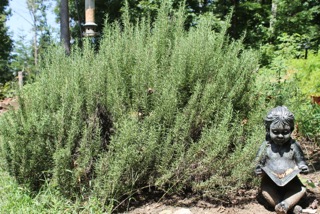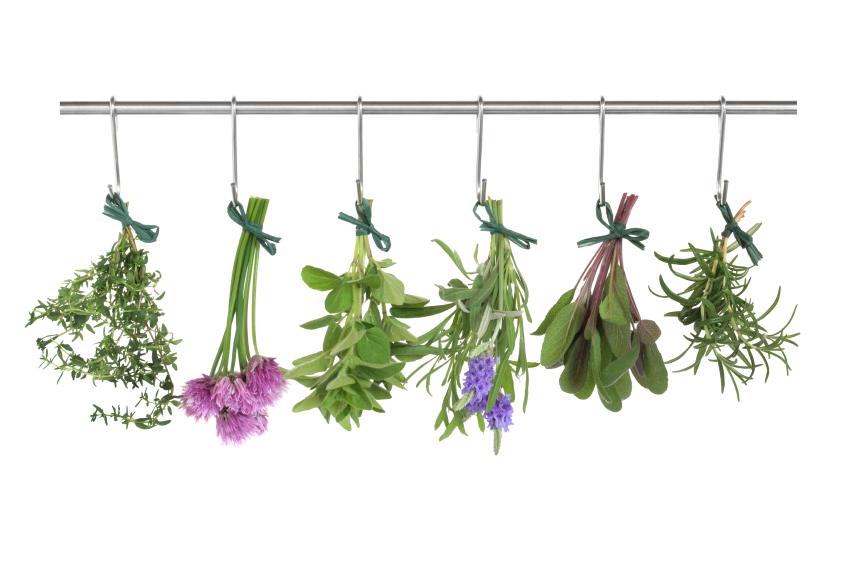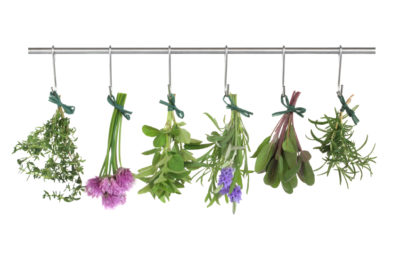As the calendar turns from summer into fall, it’s a good time to think about performing a few simple maintenance chores in your herb garden so you can enjoy your favorite herbs all year long.
Sage, Oregano, and Thyme
Now is the perfect time to cut away any dead or woody stems you find around the base of your sage, oregano and thyme plants. Also pull up any weeds you find, as they can overwinter and cause a big, overgrown mess next spring.
The most important chore for your sage, oregano and thyme plants would be to trim off the dead flower heads and to prune back just the top of the plant. Doing this will keep your plants bushy and healthy. Take caution not to trim the flower heads too low. A light snipping of the top-most leaves is usually plenty. You want these plants to have enough time to recover from the cutting before the cold weather arrives. Drastic pruning and the first frosts are not a good combination.
Save the healthy, pruned-off leaves for drying. Simply string up the sprigs of leaves on a line somewhere in your house where it is relatively warm and dry. Keep them on the line until they are ready to crumble. At this point, you can store them in an airtight container and use them for culinary and medicinal purposes.
In most climates, sage, oregano and thyme will be fine outside unprotected, even in the cold weather. However, if you live in a very cold to extremely cold climate, you may want to pot a few of these plants and take them indoors or consider giving them extra protection in the herb garden.
Mint
Mint is another perennial that will fade as the weather cools. Many gardeners and cooks like to pot up a little bit of mint to take indoors for wintertime use. This will work, but your mint may struggle indoors and become rather straggly and unhappy.
You can store mint in the freezer. Harvest your mint, clean it, and then chop finely. Pack into ice cube containers, add water, and then freeze. Pull out cubes of “fresh mint” to thaw and use as needed.
New “Survival Herb Bank” Gives You Access to God’s Amazing Medicine Chest
Chives
In many areas, chives will thrive outside in the garden until the bitter winter cold arrives. That said, it’s still a wise idea to pot a little clump of chives to take indoors, just in case Old Man Winter decides to ruin your chive crop sooner than you were prepared for. When the serious cold temps do arrive, chives will go dormant until the weather begins to warm up in the spring. Then they just pick back up where they left off! (Chives are seriously one of the easiest herbs to grow.)
Chives are very hardy and can grow almost anywhere. A sunny kitchen windowsill will usually provide your chives enough light to keep them happy until they can be replanted outdoors. Water your chives on a regular basis, as they don’t like to be dry. But do not overwater them. If you’re a gardening purist, you can feed your chives with an organic fertilizer about once a month to keep them in tip-top shape while they are indoors.
If you don’t have an indoor sunny window, you may also consider placing a pot of chives on a back deck or covered porch where they are partially protected from the wind and bitter cold, yet still receive enough light to grow normally.
Rosemary
Rosemary is a robust and hearty herb, but it is still a Mediterranean plant that can succumb to cold temperatures. It will not survive outdoors in extremely cold weather.
To save rosemary over the winter in cold climates, place the plant in a pot. About a month before the first frost is expected, bring the pot in to a protected area near the house, such as a covered porch or deck. When the temperature drops below 30 degrees  (Fahrenheit), bring them inside to a garage or basement. Only bring them inside the house as a last resort. Your rosemary will fare better outdoors with fresh air than in the dry indoor heat. Rosemary loves light — so make sure you place the pots near a window or door. Take the rosemary back outside as soon as the coldest part of winter has passed.
(Fahrenheit), bring them inside to a garage or basement. Only bring them inside the house as a last resort. Your rosemary will fare better outdoors with fresh air than in the dry indoor heat. Rosemary loves light — so make sure you place the pots near a window or door. Take the rosemary back outside as soon as the coldest part of winter has passed.
If you’d rather not fuss with your rosemary to this degree, you can always take a gamble and leave it outside. (I have had the same rosemary plant growing for the past five years here at my Zone 7 home!) If you are going to leave your rosemary outside in the dead of winter, consider covering it with a floating row cover or simply use a towel or blanket for protection when temps drop below 30 degrees, especially when the cold lasts more than a few days.
Lavender
Lavender plants will tolerate many growing conditions, but it does best in warm, well-drained soil and full sun. So if you’re allowing your lavender to stay outside in the winter, you’ll need to provide it as much sun as possible.
It might surprise the herb gardener to know that dampness, more than cold, is the culprit responsible for killing most of their lavender plants in the winter. Wet roots during the cold season can be a real problem for those trying to grow lavender and keep it outside year-round. Protect your outdoor lavender plants with an extra layer of mulch this winter. Areas where the ground routinely freezes and thaws need to be mulched even more.
You can always grow your lavender in pots to bring indoors for the winter, as long as you have a sunny spot inside for it to rest. Lavender prefers a smaller pot, where the root ball can stay compacted a little tighter. This encourages the roots to stay dry. Too large of a pot will encourage dampness you don’t want. Make sure your pot has plenty of drainage. You can place about an inch of gravel or rocks in the bottom of your pot to help with this.
Last, but not least…
As you clean up and clear out your herb garden, you may find plenty of herbs for drying that you didn’t even realize you had. It’s a great time to practice your drying skills. Dried herbs are delicious to use in the winter kitchen as they offer a taste of spring and summer past. Dry them now to enjoy the flavor in the coming cooler months. They also make great holiday gifts!











